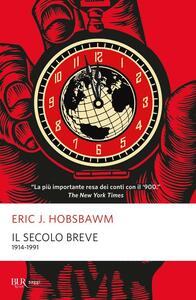Take a photo of a barcode or cover
informative
slow-paced
emotional
reflective
sad
medium-paced
challenging
dark
emotional
informative
relaxing
sad
medium-paced
challenging
dark
informative
reflective
slow-paced
informative
medium-paced
Corposo volume che percorre la storia mondiale dalla prima guerra mondiale all'inizio degli anni '90.
Il cosiddetto "Secolo Breve", un secolo nato con le guerre mondiali, le dittature, la caduta degli imperi e la nascita di nuove superpotenze globali. E proseguito con una nuova età dell'oro, balzi tecnologici e sociali inauditi, in un mondo che a velocità folle diventava totalmente diverso da quello del passato.
E poi le nuove crisi, la frantumazione di ogni certezza, il dubbio costante.
Benvenuti nel ventesimo secolo, con Hobsbawm che ci accompagna lungo questi ottant'anni di storia mostrandoci cause e effetti, politica e guerra, economia e ideologia, società, scienza e arte.
Una lettura non certo leggera ma, visto il tema e l'ampiezza dell'analisi, divulgativa e interessante.
Mi ha sicuramente messo voglia di recuperare i tre volumi precedenti sulla Storia Moderna di questo autore.
Il cosiddetto "Secolo Breve", un secolo nato con le guerre mondiali, le dittature, la caduta degli imperi e la nascita di nuove superpotenze globali. E proseguito con una nuova età dell'oro, balzi tecnologici e sociali inauditi, in un mondo che a velocità folle diventava totalmente diverso da quello del passato.
E poi le nuove crisi, la frantumazione di ogni certezza, il dubbio costante.
Benvenuti nel ventesimo secolo, con Hobsbawm che ci accompagna lungo questi ottant'anni di storia mostrandoci cause e effetti, politica e guerra, economia e ideologia, società, scienza e arte.
Una lettura non certo leggera ma, visto il tema e l'ampiezza dell'analisi, divulgativa e interessante.
Mi ha sicuramente messo voglia di recuperare i tre volumi precedenti sulla Storia Moderna di questo autore.
A broad overview of the 20th century, made more interesting because of the personal perspective of one who lived through most of it. It’s been a while since I read the original trilogy, but I felt this one didn’t quite reach the heights of those books. For one, especially in the beginning, the prose is awkward, with long sentences that require going back and forth. The style gets better along the way, but it was surprising to find readability a problem in Hobsbawm. Perhaps the fact that I know more about the 20th than the 19th century made Hobsbawm’s interpretation of the former less a discovery than his other work. But, interestingly, for all the fame he has as a ’communist’ historian, he pulls no punches when describing the disintegration of Soviet system. However, old age shows in his irritated dismissal of ’postmodernism’ and, with it, arguments for the socially construtcted nature of gender and race, for example. Even progressive scholars are limited by the world they are socialised in. However, his stance on the unsustainability—ecological and social—of rampant neoliberal capitalism is as timely as 25 years ago.
A sweeping history of the "short twentieth century", of the tumultuous period between a World War and the dissolution of Soviet Union. As is typical of Hobsbawm, we are not limited not just to the political changes of the era, but everything from the change in the nature of labour, the myriad changes in the sphere of culture and technological and scientific advancements, for which the wars in between had a major role to play. It is not quite easy to fit the whole century into a 600 page book, but Hobsbawm manages to distill all of it, without leaving hardly anything out.
I'm not giving this book a rating for a couple of reasons: I didn't read the whole lot, and it wasn't what I was hoping for.
I was hoping for a book to give me a good overview of the bits of the 20th century I need to teach my yr11 course. It didn't do that; not that much on WW1, and little on the early part of the Cold War, although some interesting and useful comments on both. It said nothing about the suffragette movement, which was disappointing, although I guess it didn't fit into his theme of extremes and catastrophes; also didn't have that much about the American/Vietnam War. So I only read a couple of chapters.
I quite liked his style - a bit rambly, and some interesting and challenging ways of looking at events and the long view of history. I'd like to say that this is the sort of book I would go back to, some time... and it would be, if only my TBR pile weren't quite so in danger of toppling and killing someone.
I was hoping for a book to give me a good overview of the bits of the 20th century I need to teach my yr11 course. It didn't do that; not that much on WW1, and little on the early part of the Cold War, although some interesting and useful comments on both. It said nothing about the suffragette movement, which was disappointing, although I guess it didn't fit into his theme of extremes and catastrophes; also didn't have that much about the American/Vietnam War. So I only read a couple of chapters.
I quite liked his style - a bit rambly, and some interesting and challenging ways of looking at events and the long view of history. I'd like to say that this is the sort of book I would go back to, some time... and it would be, if only my TBR pile weren't quite so in danger of toppling and killing someone.






